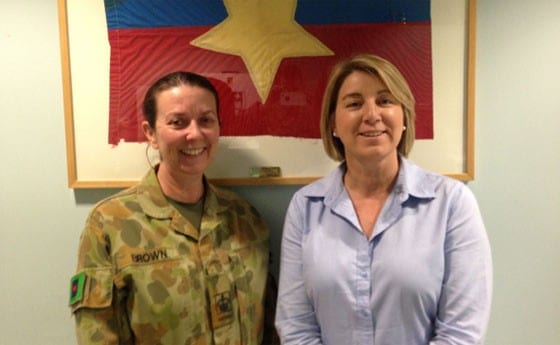Spending time with the military in Australia’s Northern Territory recently was an eye opener.
What kind of woman survives and thrives in such a ‘macho’ environment?
While I expected to hear about hardship and discrimination, the women I met spoke of being empowered, having their leadership abilities developed and their ambitions supported. They spoke of gaining enormous confidence and experiencing constant new opportunities and challenges – including some serious physical challenges.
At the risk of sounding like a recruitment poster, I was so impressed with what I saw while a guest of the Defence Reserves Support group during its ‘Boss Lift’ program. Boss Lift is an initiative designed to show employers what reservists get up to when they leave their office jobs to go on “manoeuvres”.
I met both Reservists and “regular” Army and came away with a few new thoughts regarding how women are being empowered in Defence.
Chain of command empowers women
Reaching a particular rank in the Army, Navy or Air Force symbolises a particular level of technical and leadership knowledge. Troops respect rank.
Major Rachel Brennan has been in the military for 14 years. In her Defence career, she has completed an Engineering Degree at the University of NSW, her officer training at the Royal Military College, studied a Masters of Arts, Strategy and Management at UNSW and gained fluency in Chinese and Japanese at the Defence Force School of Languages.
At 22 she was given her first leadership role – managing up to 40 mostly older tradesmen on a construction project. She was the second female troop commander they’d had and she received a positive reception because her qualifications and physical ability to do the job were understood by her troops.
Meanwhile, Warrant Officer Class Two (WO2) Michele Brown manages the finances, procurement and HR for the 1st Combat Engineer Regiment right across Australia. She told me: “There is no difference between male bosses and female boss – it is the rank that is respected.”
Never underestimate the power of getting physical
I love a bit of adventure and visiting the NT was an action week for me. I spent time with the fast-jet fighter pilots at RAAF Base Darwin. I went to the Australian Army Robertson Base and the Navy’s patrol boat base. I fired machine guns and drove a Navy Rigid Hull Inflatable Boat around at top speed. I sat in the pilot’s seat of a Tiger Attack Helicopter and pretended I could actually fly it in the simulator.
When the most physical thing you usually do at work is running for an elevator, working with your hands and being outdoors is exhilarating. The women are tough, you wouldn’t mess with them – one young female Sapper shared with me a story of carrying a 38-kilo pack for 10 km.
WO2 Michele Brown instructs soldiers in the use of machine guns and signals operations in the outback. Her daily work environment involves building grenade launching ranges, bridges and fire truck emergency response. Talk about variety and challenge?
Warrant Officer Class Two Michele Brown and Kate O’Reilly
Major Brennan says troops expect their male and female leaders to be physically fit and I think this is something that extends beyond the Defence Forces. Highly respected leaders and managers are often physically fit.
Confidence in action
It was wonderful to spend a week with people of different levels who exude confidence rather than ego.
Leaders of both genders, young and old, spoke with a calm authority. The youngest troops carried out their tasks with certainty and efficiency. Individuals were not afraid to make decisions quickly and decisively. Is it just me or is that refreshing, especially when seen in the context of today’s business environment? The corporate world seems full of people who want to avoid being responsible for making decisions.
When I quizzed the women I met about how confident they were and where that confidence came from, they credited the constant training, opportunities and challenges they’re given. For example, for the last three years Major Brennan has been given six to seven weeks leadership training a year.
Women support each other
The women I met were actively networking and maintaining their connections to other Defence women. The female networks spanned seniorities and were about friendship, support and being able to access advice and mentors, as well as champions to support career paths.
When I asked women why they chose Defence as a career option, gaining confidence from challenge and the breadth of the career opportunities available was a big part of their answers.
How many civilian employers would love to have their female staff describe their career journey that way?




